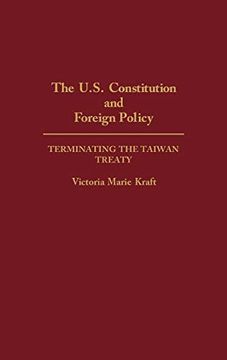Share
The U. S. Constitution and Foreign Policy: Terminating the Taiwan Treaty (Armed Forces Radio Service Discographies) (in English)
Victoria Marie Kraft (Author)
·
Greenwood Press
· Hardcover
The U. S. Constitution and Foreign Policy: Terminating the Taiwan Treaty (Armed Forces Radio Service Discographies) (in English) - Victoria Marie Kraft
$ 85.71
$ 107.14
You save: $ 21.43
Choose the list to add your product or create one New List
✓ Product added successfully to the Wishlist.
Go to My WishlistsIt will be shipped from our warehouse between
Friday, June 21 and
Monday, June 24.
You will receive it anywhere in United States between 1 and 3 business days after shipment.
Synopsis "The U. S. Constitution and Foreign Policy: Terminating the Taiwan Treaty (Armed Forces Radio Service Discographies) (in English)"
President Carter's unilateral decision to recognize the People's Republic of China as the sole legal government of China, to end diplomatic relations with the Republic of China on Taiwan, and to terminate the 1954 United States--Republic of China Mutual Defense Treaty triggered a classic constitutional separation of powers controversy between the executive, legislative, and judicial branches of government. Victoria Marie Kraft examines the important legal issues and the broader questions of constitutional law and process raised within the context of this controversy. Does the president have the constitutional power to terminate a duly enacted treaty without congressional assent? When is it constitutionally permissible for a president to act unilaterally in foreign affairs? When is congressional consultation required and does the burden of consultation lie with Congress or with the executive branch? The role of the courts in resolving disputes between Congress and the president over the proper constitutional allocation of foreign policy-making power is thoroughly scrutinized as are the long- and short-term effects on foreign policy of confrontational modes of interaction between the president and Congress. Chapter One traces the history of executive-legislative collaboration on China policy between 1949 and 1976 and underlines the role of Congress in formulating U.S. China policy which later created the legitimate expectation in Congress that active congressional participation in that area would continue. In Chapter Two, the rationale behind Carter's decision and his reasons for making that decision without consulting Congress are considered in depth. The traditional role of the federal courts in resolving foreign-policy making conflicts between Congress and the president is analyzed using Goldwater v. Carter as a starting point in Chapter Three. The last two chapters document the legislative history and constitutional controversy surrounding the Taiwan Relations Act and use the lessons of the China normalization controvercy to develop a useful standard for assessing the constitutional propriety of unilateral foreign policy making by the president. Invaluable supplemental reading for courses in Constitutional Law, Foreign Policy, the Presidency, and American Government, this volume provides a comprehensive understanding of the vital relationships among Congress, the president, the judiciary, and the constitution.
- 0% (0)
- 0% (0)
- 0% (0)
- 0% (0)
- 0% (0)
All books in our catalog are Original.
The book is written in English.
The binding of this edition is Hardcover.
✓ Producto agregado correctamente al carro, Ir a Pagar.

